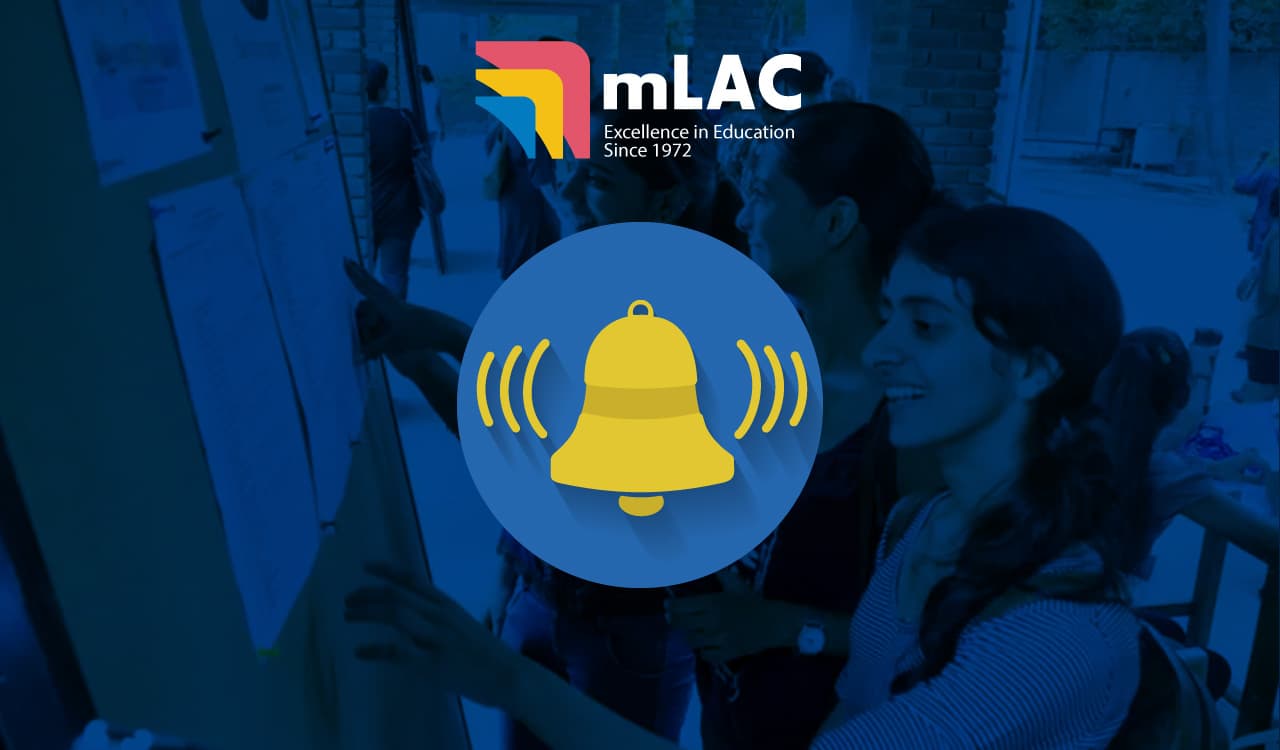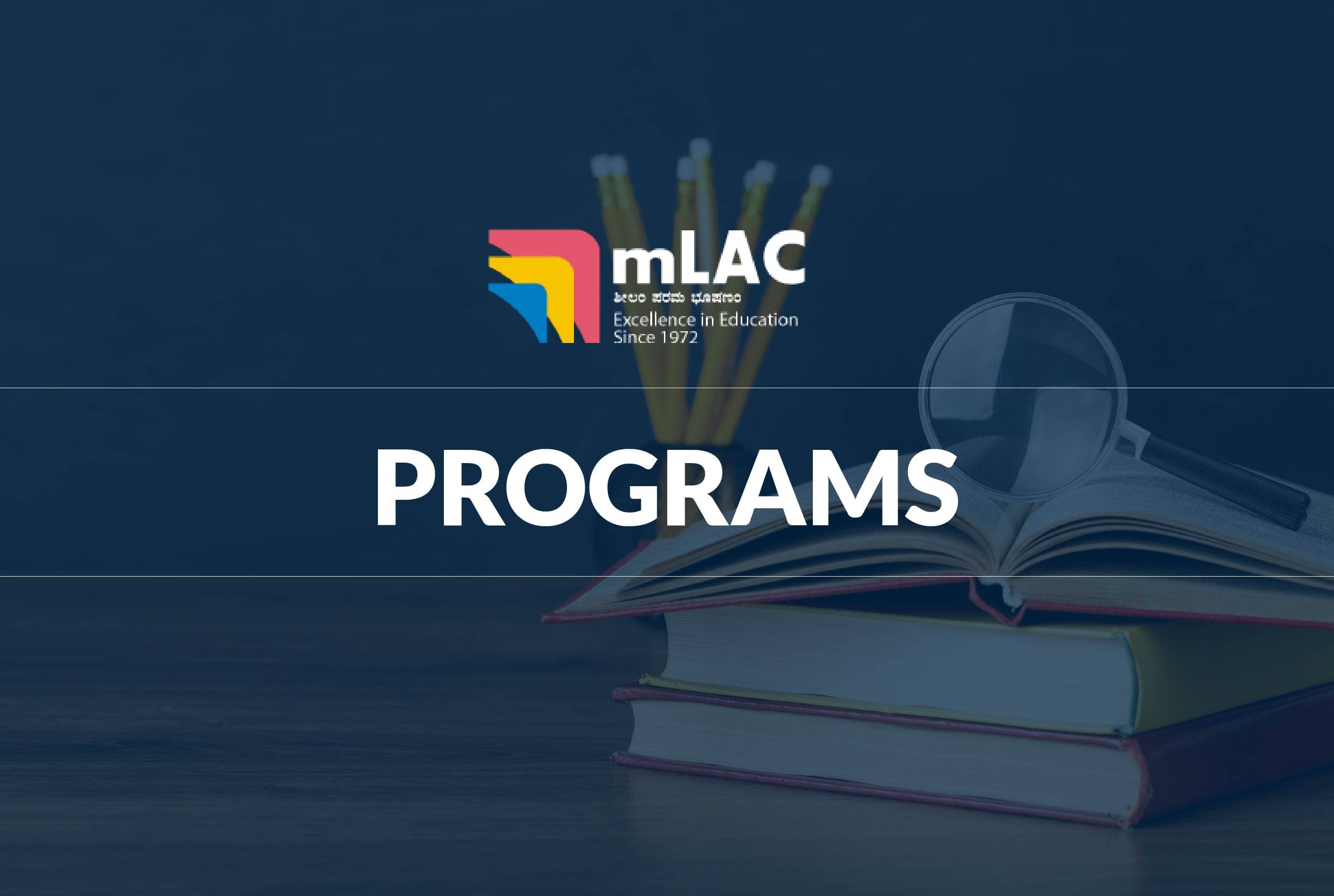MLACW (now mLAC) is an institution of excellence located strategically in the vicinity of national institutes of repute, such as Indian Institute of Science, Institute of Wood Science & Technology, National Institute of Advanced Studies, Raman Research Institute and Central Power Research Institute.

About
Department of Biotechnology (Genetics & Biotechnology)VISION OF DEPARTMENT:
Dedicated, determined and disciplined effort of the department to:
- Envision the department as Centre of Higher Learning
- Empower to be self-dependent and achieve Excellence in Research
- Develop Innovation Pedagogy leading towards Patents and EDP
- Promote a culture of Self-sustainability
MISSION OF DEPARTMENT:
To educate, escalate, enrich, empower women for tomorrow’s competitive world.
The Department of Biotechnology is one of the dynamic and vibrant departments of the college. With its unbound strength and high spirit, it organizes academic and co-curricular activities throughout the year. The Department of Biotechnology at mLAC was established in 2002. The Department has well equipped labs with state of the art facilities and undertakes several initiatives to strengthen the students capabilities. Dedicated teachers with an experience in Post-graduate teaching are highly competent to nurture the young talents through in-house research projects, hands-on sessions, all of which are aimed at generating original ideas and innovative thinking. The Mission of the Department is to educate, enrich and empower women to deal with the complexities of the competitive world.
Syllabus
| Title | Year | Download |
|---|---|---|
| BSc.CZBT (2016-2019) | 01 Jun, 2016 | Download |
| Entrepruenership Training Programme - 1 | 01 Jun, 2016 | Download |
| Entrepruenership Training Programme - 2 | 01 Jun, 2016 | Download |
| Biotechnology Skill Development | 01 Jun, 2016 | Download |
| M.Sc Biotechnology (2016-18) | 03 Jul, 2016 | Download |
| Bsc CBBT (2016-18) | 03 Jul, 2016 | Download |
| Certificate level in Bioinformatics | 01 Jun, 2016 | Download |
| Certificate level in Molecular techniques | 01 Jun, 2016 | Download |
| Diploma in Molecular techniques | 01 Jun, 2016 | Download |
| Diploma in bioinformatics | 01 Jun, 2016 | Download |
| M.Sc Biotechnology (2020-21) | 03 Jul, 2019 | Download |
| B.sc CZBT (2019-2021) | 03 Jul, 2019 | Download |
| B.sc CBBT (2019-2021) | 03 Jul, 2019 | Download |
Course Outcome
Course Outcomes- 2nd year
2nd Year
BTT 301 – PLANT AND AGRIBIOTECHNOLOGY (Specialized Hard-Core Paper) [CO 1- To understand basic components of Plant Physiology and familiarize students with plant processes mechanism and applications.]
BTT 301 – PLANT AND AGRIBIOTECHNOLOGY (Specialized Hard-Core Paper) [CO 2-To give an insight on Plant Tissue Culture – scope and importance, media, different techniques with broader vision on applications in different sector of Agriculture, Horticulture and Forestry.]
BTT 301 – PLANT AND AGRIBIOTECHNOLOGY (Specialized Hard-Core Paper) [CO 3- To obtain knowledge on Plant Transformation techniques, mechanism and emphasized on relevant updates with suitable examples. Current status of transgenic plants will be highlighted with commercial applications.]
BTT 301 – PLANT AND AGRIBIOTECHNOLOGY (Specialized Hard-Core Paper) [CO 4- To gain knowledge on Metabolic engineering of plants associated with recent research on concerned topics and suitable examples in a broader sense.]
BTT 301 – Animal Biotechnology (Specialized Hard-Core Paper) [CO 1- Understand and apply the knowledge of Concepts of developmental Biology in terms of its Potency. differentiation of embryonic and adult stem cells. Deeper understanding on the basics of different containment methods in animal cell culture studies, Types of cell cultures methods, cell lines and cell culture -scale and large-scale cultures. Extended knowledge of maintenance of cell cultures, Phases of cell growth, contamination. Cell viability and cytotoxicity tests for cells in culture - Cryopreservation of cell lines – principle, methodology and applications.]
BTT 301 – Animal Biotechnology (Specialized Hard-Core Paper) [CO 2- Will learn and update on the current innovations and applications of Stem cell culture, 3D culture and tissue engineering techniques. Three- dimensional cultures, Design stages; types of substrate/support materials and organs used or cultured in tissue engineering.]
BTT 301 – Animal Biotechnology (Specialized Hard-Core Paper) [CO 3- An elaborate knowledge on vectors used in production of transgenic animals, types of transgenic animals, techniques employed in transgenesis and its extended applications. Student will be able to differentiate between transgenesis and knockout mechanisms and correlate with the genetic and molecular techniques employed in its production. Knowledge on models used for studying various diseases and its application using transgenic and knockout model, animal as bioreactors and biopharming. Application of biotechnology in veterinary and animal sciences and conservation of species.]
BTT 301 – Animal Biotechnology (Specialized Hard-Core Paper) [CO 4- An insight and importance of ethics in science will be emphasised in this course prevalence of police. Introduction to the concepts and Good clinical practices- ICH E6 Document – guidelines, Safety in release of genetically engineered organisms, genetic modifications and food consumption. Students will learn about Animal handling and its application in animal related studies, bioethics in biodiversity, ethics of resource management, impact of patenting on biodiversity Ethical implication of human genome project.]
BTT 302: Immunotechnology [CO 1- Knowledge of the components of the immune system at the cellular and molecular level. Understanding of the mechanism of innate immunity.]
BTT 302: Immunotechnology [CO 2- Understanding the processes involved in the maturation and activation of the immune response and how it responds to the diverse antigens it encounters. Comprehend how the immune system distinguishes between self and non-self. Understand the regulation of the immune response.]
BTT 302: Immunotechnology [CO 3- Knowledge of immune dysfunction, mechanisms and effects. Understanding of tissue transplantation and rejection. Knowledge of therapies used for treating immune dysfunction and transplant rejection.]
BTT 302: Immunotechnology [CO 4- Knowledge of various immunodiagnostic techniques and their uses. Comprehension of active and passive immunization and the different types of vaccines and antibodies used respectively. Understanding the pros and cons associated with different types of vaccines/antibodies.]
BTE 304 Computational Biology and Drug Discovery (Elective) [CO 1- Bridge the fundamental concepts of computers with the present level of knowledge of the students. Familiarise operating systems, programming languages, peripheral devices, networking, multimedia and internet.]
BTE 304 Computational Biology and Drug Discovery (Elective) [CO 2- To introduces the students to fundamental concepts of databases used in bioinformatics. Familiarise algorithms and model used for the rational drug design.]
BTE 304 Computational Biology and Drug Discovery (Elective) [CO 3- To introduces the students to fundamental concepts of rational drug design. To introduces the students with molecular dynamics, simulation, and modelling for drug discovery.]
BTE 304 Computational Biology and Drug Discovery (Elective) [CO 4- To train the students in use of computer aided technology to fasten the drug discovery through simulation and modelling. To gain sufficient knowledge in molecular interactions for the better understanding of structural biology.]
BTE 304: VACCINES AND BIOTHERAPEUTICS (ELECTIVE) [CO 1- Understanding the principles of SAR and its application in drug design. Learning the use of bioinformatics methods for SAR-based drug design.]
BTE 304: VACCINES AND BIOTHERAPEUTICS (ELECTIVE) [CO 2- Knowledge of the different categories of protein biotherapeutics and the methods of production and delivery. Understanding the quality control issues involving protein therapeutics. Comprehension of the concepts underlying biobetters and biosimilars.]
BTE 304: VACCINES AND BIOTHERAPEUTICS (ELECTIVE) [CO 3- Knowledge of different nucleic acid and cell-based biotherapeutics.]
BTE 304: VACCINES AND BIOTHERAPEUTICS (ELECTIVE) [CO 4- Knowledge of the different types of vaccines and their administration. Understanding the principles of vaccine design, including disease-specific vaccine design. Knowledge of the latest vaccine technologies.]
BTS 307- RESEARCH METHODOLOGY & BIOSTATISTICS [CO 1- Understand some basic concepts of research and blooms taxonomy of learning levels.]
BTS 307- RESEARCH METHODOLOGY & BIOSTATISTICS [CO 2- Identify appropriate research topics, select and define appropriate research problem and parameters, apply statistical tools in design, research and development, understand, implement and interpreted the general and specific research patterns.]
BTS 307- RESEARCH METHODOLOGY & BIOSTATISTICS [CO 3- Prepare a project proposal (to undertake a project). Organize and conduct research (advanced project) in a more appropriate manner. Write a research report and thesis. Write a research proposal (grants).]
BTS 307- RESEARCH METHODOLOGY & BIOSTATISTICS [CO 4- Find the topics from current research in statistics education.]
BTS 308 SKILL COMPONENT and critical analysis of classical papers –Soft core [CO 1- Understanding of the principles underlying the different techniques. Learning to choose the technique(s) to be used in different experiments. Carry out experiments using appropriate technique(s). Review the papers and article with suitable interpretations.]
BTP 306 Plant Biotechnology & Agribiotechnology (Specialization) [Entrepreneurial ability to develop Plant tissue culture lab.]
BTP 306 Plant Biotechnology & Agribiotechnology (Specialization) [Research based attitude to develop transgenic plants of commercial interest.]
BTP 306 Plant Biotechnology & Agribiotechnology (Specialization) [Entrepreneurial ability to grow Mushroom or biocontrol agents as fertilizer on commercial scale]
BTP 306 Plant Biotechnology & Agribiotechnology (Specialization) [Obtain expertise in Molecular techniques and get aligned with industry requirement.]
BTP 306 Practicals Animal Biotechnology [GLP in an animal cell culture lab, fumigation and preparation of media.]
BTP 306 Practicals Animal Biotechnology [Students will be able to isolate, culture and identify the cells.]
BTP 306 Practicals Animal Biotechnology [Passage and cell viability techniques.]
BTP 306 Practicals Animal Biotechnology [Skills for anchor based and suspension culture method.]
BTP 306 Practicals Animal Biotechnology [Use and maintenance of animal Cell culture lab.]
BTP-307: IMMUNOTECHNIQUES, BIOSTATISTICS AND COMPUTATIONAL BIOLOGY [Perform basic immunological techniques like immunoprecipitation and ELISA.]
BTP-307: IMMUNOTECHNIQUES, BIOSTATISTICS AND COMPUTATIONAL BIOLOGY [Carry out partial purification of immunoglobulin.]
BTP-307: IMMUNOTECHNIQUES, BIOSTATISTICS AND COMPUTATIONAL BIOLOGY [Perform lymphocyte proliferation assay and understand the context of use.]
BTP-307: IMMUNOTECHNIQUES, BIOSTATISTICS AND COMPUTATIONAL BIOLOGY [Knowledge of the technique of FACS and its applications.]
BTP-307: IMMUNOTECHNIQUES, BIOSTATISTICS AND COMPUTATIONAL BIOLOGY [Perform biostatistical analysis using software.]
BTP-307: IMMUNOTECHNIQUES, BIOSTATISTICS AND COMPUTATIONAL BIOLOGY [Carry out visualization of structures.]
BTP-307: IMMUNOTECHNIQUES, BIOSTATISTICS AND COMPUTATIONAL BIOLOGY [Performing molecular docking and molecular dynamics studies.]
BTT-401 FERMENTATION TECHNOLOGY [CO 1- To understand basics of microbial technology and familiarize with different fermentation media components and sterilization techniques to obtain a broad overview of Fermentation.]
BTT-401 FERMENTATION TECHNOLOGY [CO 2- To obtain knowledge on types of Fermentation process with kinetics and other parameters of Fermentation process. A detailed account on different types of Bioreactors will be dealt with deep understanding on working mechanism and its applications.]
BTT-401 FERMENTATION TECHNOLOGY [CO 3- A deep understanding on Downstream Processing will be dealt by considering various methods applicable in industry. Objective of each method will be highlighted with working mechanism and commercial applications will be focused.]
BTT-401 FERMENTATION TECHNOLOGY [CO 4- This unit intends about production of industrially important products focused on industrial set-up and recovery of various commercial products. A detailed account on steps involved in production, recovery and applications will be highlighted. Students will be able to understand industry scenario in production of commercial products.]
BTT402 Emerging trends in Biosciences [CO 1- Students will learn basics as well as synthesis of nanoparticles and the structures of the same.Enhanced knowledge on the biological synthesis of nanoparticles along with its applications in various aspects of science.]
BTT402 Emerging trends in Biosciences [CO 2- Awareness on physiology and anatomy of humans of specific organs, its functions, disorders.The chapter also deals with introduction to cancer biology as well as forensic science.]
BTT402 Emerging trends in Biosciences [CO 3- Students will learn about marker systems, sequencing methods along with mapping idea in genomics. Enhancement in their knowledge with protein-based techniques and its applications will impart knowledge in proteomics. Introduction to metabolomics, lipidomics, metagenomics and systems biology will enhance their knowledge of students.]
BTT402 Emerging trends in Biosciences [CO 4- This chapter deals with different aspects involved in drug designing. Imparting the knowledge of Pre-clinical development and clinical trials.]
BTE- 403: Bio-entrepreneurship and Intellectual Property Rights (Elective) [CO 1- Explains about how a research can be taken ahead to build a bio based product and the same can be further proceeded to become an entrepreneur. Students will learn how to build up a business as well as strategies and where they will be selling the products.]
BTE- 403: Bio-entrepreneurship and Intellectual Property Rights (Elective) [CO 2- Students will learn how they can generate revenue for running the business and how to develop a financial flow models to generate income. Awareness on various practices and maintaining the rules to licence the technology.]
BTE- 403: Bio-entrepreneurship and Intellectual Property Rights (Elective) [CO 3- Students will learn various aspects of Intellectual property rights and how they are distributed among the countries. Patenting the technology or the product is the essential thing in bio based business and hence awareness of the same will be imparted to the students.]
BTE- 403: Bio-entrepreneurship and Intellectual Property Rights (Elective) [CO 4- Awareness on various steps involved in development of a product which is biosafe and the regulations that approve the products. Students will understand the regulations for approval at the level of nation as well as international conditions. They will also learn about the ethics concerned in various fields of medical, animal and plant biotechnology.]
BTE 403: FOOD TECHNOLOGY & Quality assurance (Elective) [CO 1- To understand basics of Food and Food processing with reference to various commodities. Knowledge from food industry scenario will be considered to obtain better understanding on topic.]
BTE 403: FOOD TECHNOLOGY & Quality assurance (Elective) [CO 2- A deeper understanding on Food Microbiology and Food Preservation will be dealt in this unit. Current research happening in this sector will be emphasized to obtain a broader vision on topic. Various examples and applications will be covered to obtain thorough knowledge on topic.]
BTE 403: FOOD TECHNOLOGY & Quality assurance (Elective) [CO 3- To familiarize with Neutraceutical foods with examples. Quality Control characteristics and parameters will be discussed in detail.]
BTE 403: FOOD TECHNOLOGY & Quality assurance (Elective) [CO 4- To familiarize with Neutraceutical foods with examples and production will be highlighted. Quality Control characteristics and parameters will be discussed in detail giving an overview on industrial set-up aspects.]
BTP 404 Fermentation, food and emerging technology [• Students will learn to the isolation of organic acids, antibiotics, SCP, alpha amylase]
BTP 404 Fermentation, food and emerging technology [• Enhanced working knowledge on various techniques like RT PCR, SGOT, serum cholesterol, creatine, synthesis of nanoparticles an its efficacy in anti-bacterial activity and many others]
Reports
| Title | Year | Download |
|---|---|---|
| Annual Activity Report of IP Cell | 19 Feb, 2024 | Download |
| NASA OUTREACH PROGRAM | 05 Mar, 2024 | Download |
Groups
Programs
Our Faculty
Dr.Babitha.B
Science Co-ordinator
Dr Sushil Kumar Middha
Research co-ordinator
Dr.Jolitha.A.B
Academic co-ordinator
Ms.Hemavathy.E
Head of Department
Dr.M.Gowri Neelima
Assistant Professor
Archana Preetha R
Assistant Professor
Dr.S.Saraswati
Associate Professor
Ranjitha A
Assistant Professor
Vishali S
Assistant Professor
Dr. ARUNA L. HUGAR
Assistant Professor





















